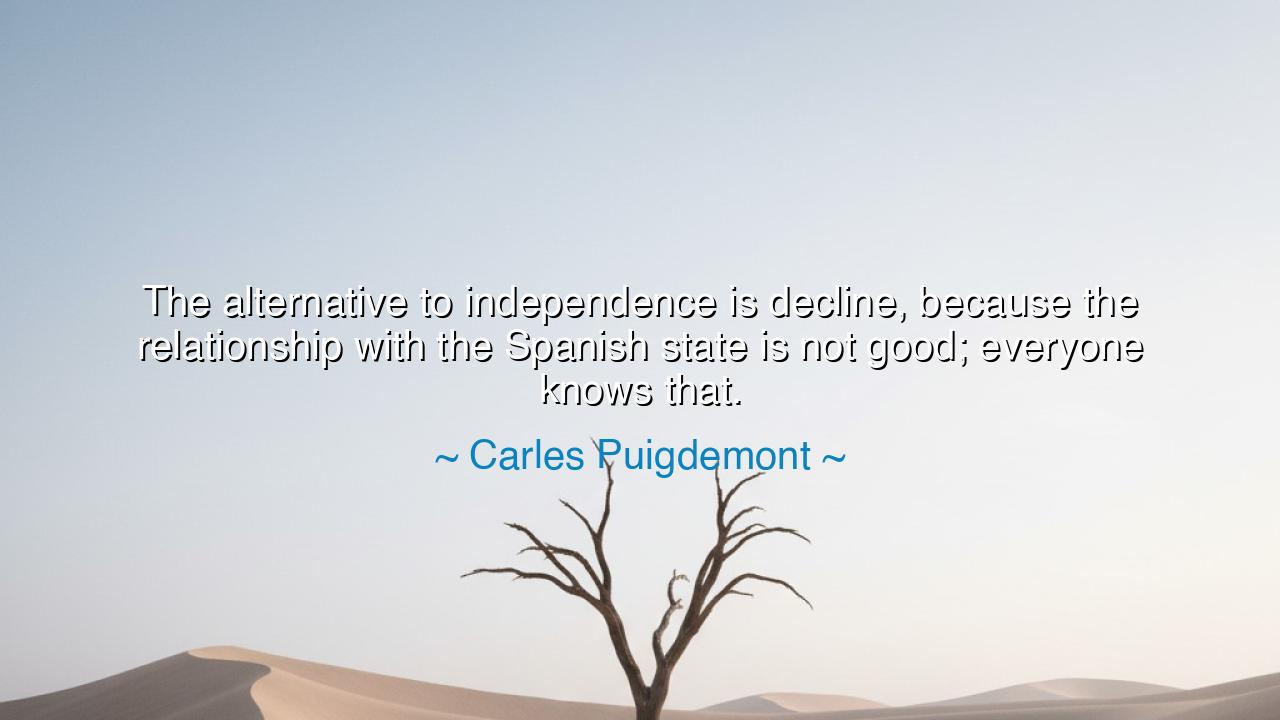
The alternative to independence is decline, because the
The alternative to independence is decline, because the relationship with the Spanish state is not good; everyone knows that.






"The alternative to independence is decline, because the relationship with the Spanish state is not good; everyone knows that." – Carles Puigdemont
Listen, O sons and daughters of destiny, to these words that thunder with the weight of history. When Carles Puigdemont, leader of Catalonia’s independence movement, spoke them, he did not speak in arrogance, but in sorrow and truth. His was the cry of a people bound in a union that had become a burden, not a bond — a relationship that once promised cooperation but had withered into conflict. He saw clearly what many fear to name: that when the spirit of a people is denied its freedom, it does not rest in peace; it withers, it declines, it fades into silence. Thus, he proclaimed that the alternative to independence is decline, for stagnation follows when the will of a nation is chained.
The meaning of this statement lies not merely in politics, but in the heart of human nature itself. Every soul, every people, and every nation must grow according to its own truth, or else decay. When the tree of life is planted in soil that no longer nourishes it, it must either be transplanted or die. Independence, then, is not simply the act of separation, but the renewal of growth, the turning toward light after long shadow. Puigdemont’s words echo the same eternal principle that guided every struggle for liberty: when harmony is lost, dependence becomes decay.
Let us look to the past for proof of this timeless truth. In the early nineteenth century, the Greek people rose against the Ottoman Empire after centuries of subjugation. The empire had grown oppressive, its governance distant and uncaring. To remain bound under its rule meant slow decline — not merely of power, but of soul. Yet when the Greeks claimed independence, they revived their ancient spirit, their art, their faith, their pride. It was a painful birth, for freedom always demands sacrifice, but from that struggle arose a renewed nation that reclaimed its identity. So too, Puigdemont speaks for Catalonia — not out of hatred, but out of longing for rebirth.
To understand him, one must see the deeper struggle beneath his words. He does not call for independence merely as a political goal, but as a moral necessity. When a people’s voice is dismissed, when their aspirations are treated as noise rather than reason, decline is inevitable. The relationship with the Spanish state is not good, he said — and in that simple phrase lies a profound wisdom. A relationship, whether between nations or individuals, cannot survive without respect. Where one commands and the other obeys, harmony dies. Where dialogue turns to dominance, cooperation turns to decay.
Yet, Puigdemont’s warning extends beyond Catalonia. It speaks to every person who lives within an unbalanced bond — whether of nation, of work, or of spirit. To remain in a union that denies your worth is to shrink the soul; to seek your own path is to honor the divine law of growth. This is not rebellion born of pride, but courage born of truth. When he says “everyone knows that,” he reminds us that truth, once seen, cannot be unseen. The choice then becomes simple: act, or decline.
But beware, for independence is no easy road. It is not a flight from struggle, but a deeper one. The one who seeks freedom must bear both its cost and its weight. Yet, as the ancients taught, better the hardship of liberty than the comfort of bondage. A stagnant peace may feel safe, but it is the stillness of decay. A turbulent freedom may be fierce, but it is alive. Puigdemont’s words call us, as all great voices do, to choose life — to risk discomfort for the sake of dignity.
Thus, the lesson shines clear as dawn: never accept decline when freedom is possible. Whether you are a people bound by politics or a soul confined by fear, know that remaining silent in a broken relationship is to consent to your own fading. Seek independence of mind, of spirit, and of purpose. Nurture relationships built on respect and equality, not submission. And when the time comes to choose — between comfort that kills and struggle that awakens — choose the struggle. For as Puigdemont and countless heroes before him have shown, decline may come from dependence, but greatness is always born from the courage to be free.






AAdministratorAdministrator
Welcome, honored guests. Please leave a comment, we will respond soon